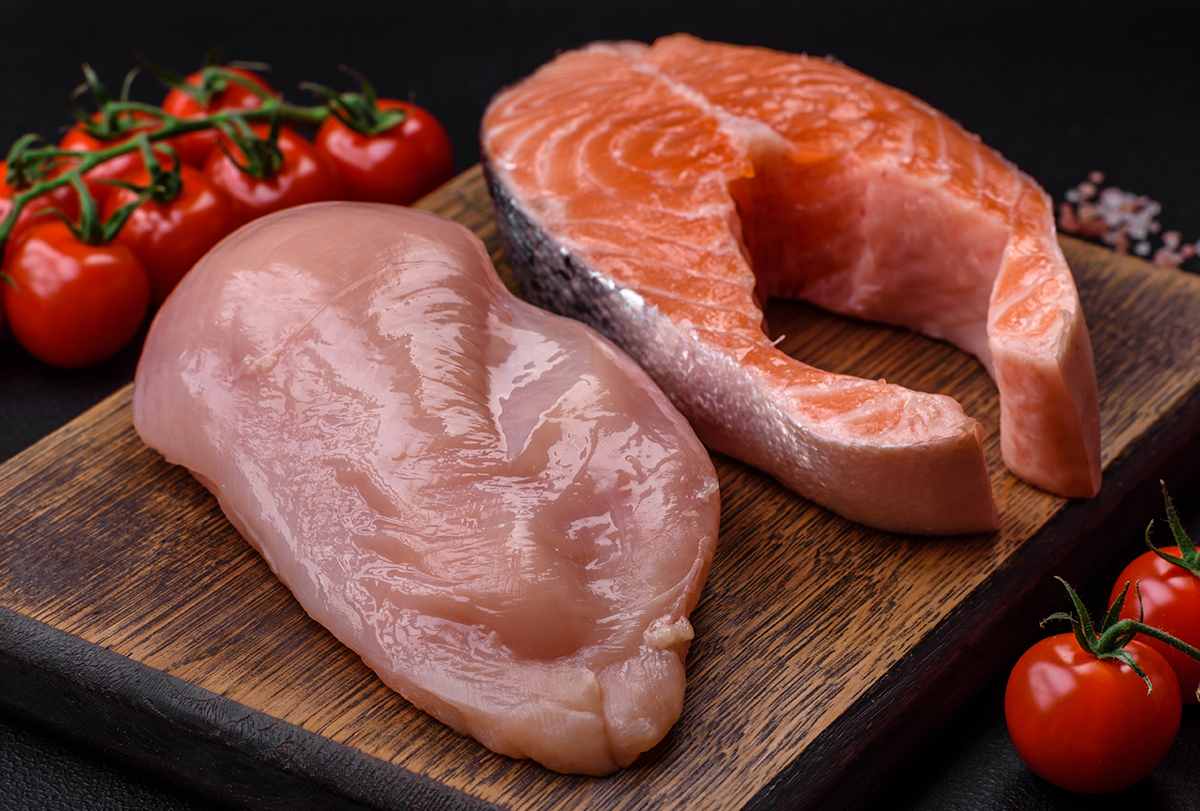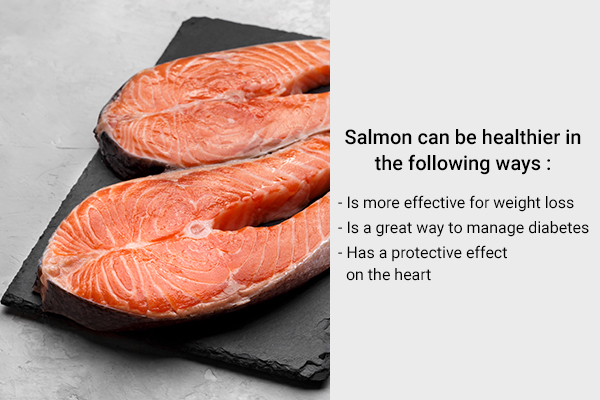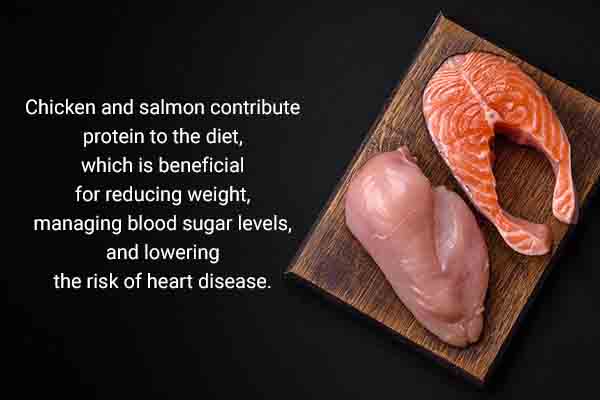In this article:
Chicken and salmon are important sources of protein for a nonvegetarian person. Chicken is a poultry food, whereas salmon belongs to the category of seafood. Despite differences in classification, they both offer a variety of health benefits and nutrients.

Generally chicken (meat only) is a low-calorie and low-fat nonvegetarian option, with a 100 g serving providing 111 calories and 2.7 g of fat. (1)
The same serving of salmon provides 117 calories and 4.3 g of fat. (2) However, salmon contains more overall nutrients such as vitamins B12, B6, D, selenium, and copper, making salmon a healthier choice than chicken.
Salmon Versus Chicken: Nutritive Value
As discussed above, 100 g of chicken meat contains 111 calories, 20 g of protein, 2.7 g of fat, and 22% of the daily requirement of cholesterol. (1)
It also provides these nutrients: (1)
- 10% of the daily requirement of vitamin B2
- 49% of the daily requirement of vitamin B3
- 21% of the daily requirement of vitamin B5
- 25% of the daily requirement of vitamin B6
- 15% of the daily requirement of vitamin B12
- 31% of the daily requirement of selenium
- 16% of the daily requirement of phosphorus
- 11% of the daily requirement of zinc
- 6% of the daily requirements of copper and iron
- 6% of the daily requirements of iron
On the other hand, 100 g of salmon contains 117 calories, 18 g of protein, 4.3 g of fat, and 8% of the daily requirement of cholesterol. (2)
It also provides these nutrients: (2)
- 8% of the daily requirement of vitamin B2
- 30% of the daily requirement of vitamin B3
- 16% of the daily requirement of vitamin B6
- 136% of the daily requirement of vitamin B12
- 86% of the daily requirement of vitamin D
- 56% of the daily requirement of selenium
- 13% of the daily requirement of phosphorus
- 3% of the daily requirement of zinc
- 26% of the daily requirement of copper
- 5% of the daily requirement of iron
Moreover, because salmon is seafood, it contains 29% of the daily requirement of sodium as compared to 3% in chicken. (1)(2)
Reasons Salmon Is Healthier Than Chicken
While including both chicken and salmon as part of the regular diet can offer health benefits, salmon can be healthier in the following ways.

1. Is more effective for weight loss
Protein is an important nutrient that plays a crucial role in weight management. Multiple studies have emerged that outline the role of consuming adequate protein as part of the daily diet to prevent weight gain and even bring about weight loss. (3)
Although the recommended daily intake is 0.8 g/kg body weight, (4) studies have identified consuming more protein than the recommended intake (up to 50% of the total calories) was more effective in reducing weight. (3)
Poultry meat such as chicken not only contributes to the overall quality of the diet but also provides high amounts of protein, which can be useful for reducing weight. (5)
However, in a study done on seafood consumption and weight loss, salmon was found most effective in reducing weight as well as inflammation, which can cause diseases in the human body. (6)
2. Is a great way to manage diabetes
People with diabetes benefit from consuming a high-protein diet. Studies have found participants who consumed 23%–32% of total calories from protein reported better blood glucose control. (7)
In diabetes, an elevated blood sugar level can lead to diabetic complications and damage to organs such as the eyes, nerves, kidneys, and blood vessels. (8)
For this reason, including salmon as part of a diabetic diet can be beneficial.
3. Has a protective effect on the heart
Compared to processed meat and red meat, poultry meat such as chicken is not likely to raise the risk of developing heart diseases. In fact, the consumption of poultry as a substitute for red or processed meat lowers the risk of coronary heart disease, strokes, and other heart diseases. (9)
However, when it comes to protecting heart health, a large population study observed consuming fish such as salmon to be more beneficial than chicken, owing to the omega-3 fatty acid content of this seafood. (10)
Omega-3 fatty acids are potent anti-inflammatory agents that can reduce triglyceride levels and the formation of cholesterol, lowers blood pressure, and strengthens blood vessels. (11)
How Is Chicken Different From Salmon?
Raw chicken is pale pink and turns completely white when cooked. The cuts of chicken most preferred include breast piece, which is devoid of bone, and thigh and leg pieces, which are slightly darker than breast pieces. (12)
Raw salmon is pinkish-red, and its color plays a major role in its marketability. Salmon loses its color when cooked, but unlike chicken, it is also eaten raw in sashimi and poke bowls. (13)
Both can be cooked by grilling, roasting, or baking.
Precautions to Consider
Salmon is popularly consumed raw, but this mode of consumption poses certain health risks. The contaminants found in raw salmon can add up to more than the tolerable amounts, leading to health risks.
Studies have found eating raw salmon causes intestinal parasites, which can cause symptoms such as diarrhea. (14)(15) In addition, raw salmon can also be a vehicle for mercury, which is a heavy metal and poses health risks to humans. (16)
Raw chicken, on the other hand, is a source of pathogenic bacteria such as Salmonella and E. coli. (17) It is recommended to cook chicken well before eating to prevent illnesses from these bacteria.
Recently, the Food and Drug Administration has passed recommendations asking consumers to avoid washing well-cleaned raw chicken as it can cause the bacteria to disperse and settle onto other surfaces of the kitchen such as sinks, countertops, utensils, etc. This “splashing” can contaminate other sources of food prepared in the same space, especially if they are eaten raw such as salads. (18)
Practical Takeaways

- Chicken is poultry meat, whereas salmon is seafood.
- Chicken is lower in calories and fat than salmon, but salmon has a higher nutrient profile when it comes to vitamin B12, selenium, and vitamin D, which is lacking in chicken.
- Both chicken and salmon contribute protein to the diet, which is beneficial for reducing weight, managing blood sugar levels, and lowering the risk of heart disease.
- Both chicken and salmon should be cooked well as eating them raw can lead to infections by disease-causing bacteria.
- Was this article helpful?
- YES, THANKS!NOT REALLY


